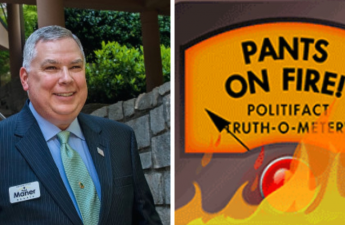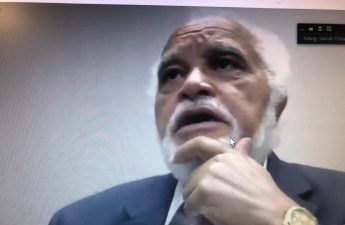 The Southern Baptist Convention was formed in Augusta, Georgia in 1845 due to schism between North and South over slavery. The SBC continued on its peculiar path after the Civil War, and the nation’s largest Protestant denomination became a bulwark of white supremacy and segregation. In 1995, the organization finally renounced its racist origin and subsequent practices. Since then, minority membership in the SBC has increased dramatically.
The Southern Baptist Convention was formed in Augusta, Georgia in 1845 due to schism between North and South over slavery. The SBC continued on its peculiar path after the Civil War, and the nation’s largest Protestant denomination became a bulwark of white supremacy and segregation. In 1995, the organization finally renounced its racist origin and subsequent practices. Since then, minority membership in the SBC has increased dramatically.
On Monday, 167 years after its founding, a historic change occurred. By acclamation, the convention selected African-American minister Fred Luter Jr. of New Orleans as its first black president.
The New Orleans Times-Picayune coverage includes background on Luter, who built a tiny congregation into a massive one and was forced to rebuild it again after Hurricane Katrina:
Although Luter acknowledged that his election was an example of the denomination’s commitment to diversity, he said the measure of this commitment to broadening that appeal will happen after he leaves office.
“If we stop appointing blacks and Hispanics to leadership positions after my administration, we will have failed,” he said.
It is estimated that about one-fifth of Southern Baptists are members of minority groups, up from 5 percent in 1990. Luter’s candidacy had been seen as a way of healing the racism that had been at the foundation of the denomination, which was formed in 1845 by people who favored slavery.
There’s also been some controversy over the group’s name—for the past 100 years or so:
Because some people have considered the Southern Baptist Convention’s name a factor that repels African Americans, a resolution to adopt an optional, alternative name, Great Commission Baptists, was debated heatedly Tuesday.
This is not a new notion. It was first proposed in 1903 and many times since, failing every time.
“This is an issue that just won’t die,” said Jimmy Draper, chairman of the task force recommending the new name.
The issue was voted on, but the ballots had not been counted by the end of today’s session. The results will be announced Wednesday.
Luter backed the alternative name, calling it “a win-win issue,” especially for churches outside the South and in minority communities that might flinch at the Southern name and the legacy it can evoke.
He said he was surprised by the debate over the name option, calling the issue something relatively minor that everyone in the church should agree upon.
“Until the outside world sees us getting along, . . . we will always have the reputation that those are the folks who just can’t get along,” he said.
Liked this post? Follow this blog to get more.



